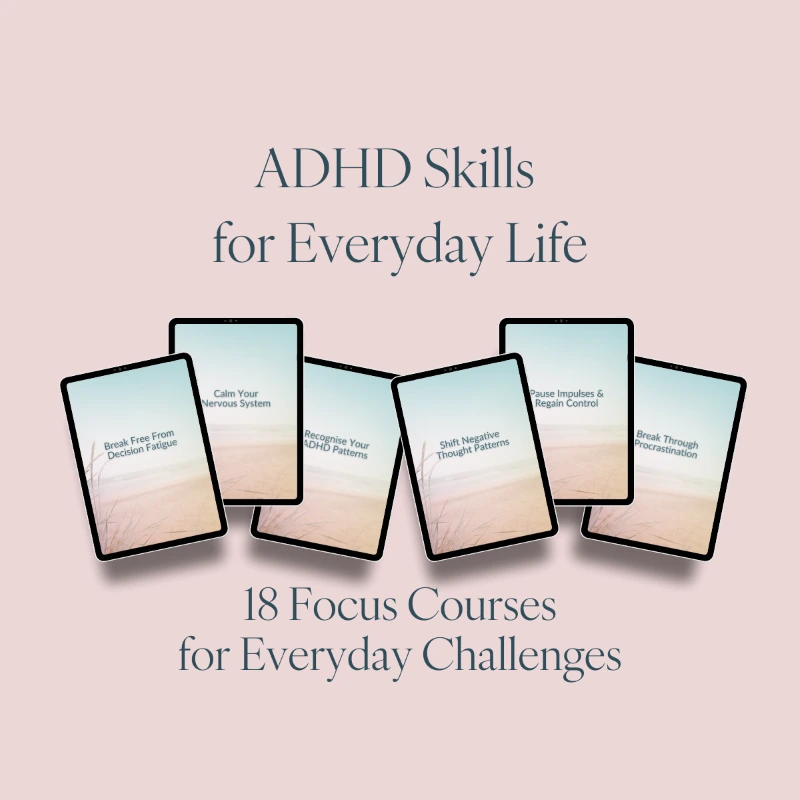When your brain feels different week to week, it’s not about motivation. It might be your hormones messing with your ADHD.
If everything gets ten times harder around the time your period starts shifting, or your emotions swing wildly out of nowhere, you’re not imagining it.
And if you only started wondering about ADHD when perimenopause hit and life suddenly felt unmanageable, again, you’re not alone.
It could be that you’ve spent years getting by, doing well, even, but holding it all together through sheer determination and masking. And then the hormones shift, and the wheels come off.
The connection between ADHD and hormones isn’t obvious, until you’re living it.
Why It’s Not Just You – It’s Your Cycle
Hormonal changes don’t just affect your body. For women with ADHD, they can impact mood, memory, motivation, and focus in a big way.
Let’s start with the menstrual cycle. Understanding what’s happening week to week can change the way you care for your brain, and stop the cycle of blame and burnout.

Here’s What Your Cycle Is Doing to Your ADHD
Menstrual Phase (Days 1-5)
Oestrogen and progesterone are at their lowest. You might feel tired, withdrawn, or mentally foggy. Some women notice fewer ADHD symptoms here, others feel like they’ve been hit by a truck.
Follicluar Phase (Days 6 -14)
Oestrogen rises, and with it, dopamine. This is when ADHD often feels easier to manage. You’re clearer, more focused, more creative. Tasks that felt impossible a week ago? Suddenly done by lunchtime.
Ovulation (Around Day 14)
Oestrogen peaks. For many, this is a great few days. But for some, especially those prone to anxiety or emotional sensitivity, this is where big feelings show up. Impulsiveness, irritability, or pressure to “make the most of it” can creep in.
Luteal Phase (Days 15–28)
Oestrogen drops, and progesterone rises. This is often the hardest stretch. You might notice:
- Mood swings or emotional reactivity
- Focus and motivation disappearing
- Rejection sensitivity going through the roof
- Everything feeling louder, harder, more overwhelming
And through all of this, you’re expected to keep going as if nothing’s changed. It’s no wonder so many women feel like they’re failing, or that something must be wrong with them.
Then Comes Perimenopause…
And that’s where everything can really shift.
I’ve coached women who didn’t realise they had ADHD until they hit their 40s. Perimenopause landed, the old coping mechanisms stopped working, and life started falling apart in ways they couldn’t explain.
And it’s not just brain fog or forgetfulness. It’s:
- Missing appointments
- Snapping at people you love
- Starting projects and leaving them half-finished
- Crying over things that never used to bother you
- Feeling like everything’s harder than it used to be
Oestrogen becomes more unpredictable in perimenopause, and with it, your brain’s access to dopamine and serotonin takes a hit. You lose the emotional buffer you didn’t even know you had, and it’s exhausting.
I’ve had many conversations with women who thought they were just keeping it all together, until they couldn’t anymore. The old ways of coping stopped working, and they were left wondering what had changed, and why everything suddenly felt so much harder.
Why Understanding Hormones Matters in ADHD
When your usual ADHD challenges, suddenly intensify, it is easy to assume something is wrong with you. Many women blame motivation, willpower, or personality, without realising how strongly hormones influence attention, emotions, memory, and stress tolerance.
For women with ADHD, hormonal shifts can amplify traits that already exist. The strategies that once worked may stop helping, not because you are failing, but because your brain chemistry has changed. Without this understanding, many women push themselves harder, which often leads to burnout rather than relief.
Learning how hormones interact with ADHD helps take the blame out of the picture. It reframes symptoms as signals rather than personal shortcomings, and opens the door to more compassionate ways of managing energy, expectations, and workload.
You Are Not Broken
ADHD does not exist in isolation from the body. Hormonal changes can intensify emotional sensitivity, reduce access to motivation, and make everyday demands feel overwhelming. When this happens, it does not mean you are going backwards or losing control. It means your nervous system is under more strain than usual.
Understanding this connection can be grounding. It allows you to stop judging yourself for fluctuating capacity and start responding with more flexibility and care. Some weeks will feel easier, others heavier, and both can exist without meaning anything negative about who you are.
For many women, simply realising that these shifts are real and explainable is a turning point. It replaces confusion with clarity and self criticism with understanding.
You’ll find much more about how hormones affect ADHD in my self-guided course Hormones, Emotions and You.



